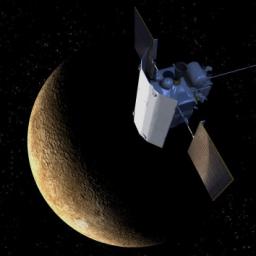NASA spacecraft to impact planet Mercury on Thursday
 Launched in 2004, NASA's Mercury-orbiting spacecraft, Messenger, is going out with a bang this week, adding a hefty crater to the little planet closest to the sun. The first spacecraft to circle Mercury, Messenger is expected to slip out of orbit and slam into Mercury on Thursday following a successful four-year tour of the rocky planet. The spacecraft will be traveling 8,750 mph (14,081 kph) when it hits, fast enough to carve out a crater 52 feet (16 meters) wide. The spacecraft itself stretches 10 feet (3 meters) solar wingtip to wingtip. Only one other spacecraft, NASA's Mariner 10, has ever visited Mercury, and that was back in the 1970s. Mariner 10 flew past, but did not orbit the innermost planet.
Launched in 2004, NASA's Mercury-orbiting spacecraft, Messenger, is going out with a bang this week, adding a hefty crater to the little planet closest to the sun. The first spacecraft to circle Mercury, Messenger is expected to slip out of orbit and slam into Mercury on Thursday following a successful four-year tour of the rocky planet. The spacecraft will be traveling 8,750 mph (14,081 kph) when it hits, fast enough to carve out a crater 52 feet (16 meters) wide. The spacecraft itself stretches 10 feet (3 meters) solar wingtip to wingtip. Only one other spacecraft, NASA's Mariner 10, has ever visited Mercury, and that was back in the 1970s. Mariner 10 flew past, but did not orbit the innermost planet.Messenger has run out of fuel, but ground controllers managed in recent weeks to eke out some extra life, raising Messenger's orbit by dipping into helium gas reserves not originally intended for use as fuel. But now that's all gone and Messenger is at the mercy of gravity. "I guess the end is coming," the Messenger team said via Twitter earlier this week. "After 10 years, spacecraft will end life as just another crater on Mercury's surface." Messenger is expected to crash into the side of Mercury facing away from Earth, so there will be no cameras or observatories to witness the impact. Scientists expect to gather information from Messenger until 10 to 15 minutes before its fatal plunge. The expected crash site is about two-thirds of the way up the planet, near the north pole.